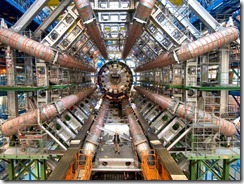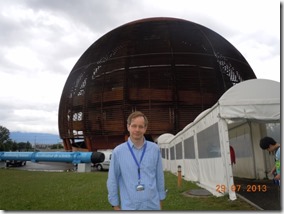Large Hadron Collider

Large Hadron Collider,
photo by John NabCERN (European Organization for Nuclear Research) is home to the Large Hadron Collider. The 27 km, Euro 6 billion Collider lies on the border between France and Switzerland, took nearly 30 years to complete.
Some of the lofty goals for the collider include the search for and investigation of the Higgs boson particle, dark energy, anti-mater, other dimensions and small black holes.
hadron – subatomic particles made of quarks and held together by the strong force. Best know are protons and neutrons, although there are many others.
How it works
Electric fields accelerate two beams of protons in opposite directions. These fly around the 27 km loop thousands of times a second until they reach very nearly the speed of light. The two beams are then directed into each other at the experiment points, where collisions occur. During these collisions, the kinetic energy of the protons is converted into mass and hopefully new particles of interest.
The various experiments measure and analyse these new particles; proving proposed theories or finding new things.
To fully understand the Collider and how the Collider works the BBC have a really good and interesting interactive presentation (lots of graphics, details and videos) at:
http://news.bbc.co.uk/1/hi/sci/tech/7543089.stm
Progress of Far
For the last two years and up until the end of 2012 the Collider has been working and will continue to. During the period massive amounts of data are being collected which which needs on-going analysis. At the end of 2012 the Collider will be shut down in preparation for stating runs of higher energy in 2014.
Scientists are reported progress in understanding matter and investigations in to what happens immediately after the big bang – probably much of which is not understandable to most of us.
Concerning the existence (or non-existence) for the Higgs boson, this still remains unconfirmed. On a more headline type note the Collider has identified a new particle known as an excited neutral Xi-b baryon further enhancing our understanding of particle physics.
Finally concerns voiced prior to stating operation of the Collider on the possibly of creating black holes which could be large enough to suck the earth in appear not to have come true. Bit of good fortune for all of us.
5 July 2012 – Update
Adding this update as yesterday it was announced the a particle consistent with that of the Higgs boson has been found. If proved, then all the hard work has paid off. Congratulations to the everyone involved in the project.
From the BBC - Higgs boson-like particle discovery claimed at LHC
The Android App
Possibly most of the existing discoveries are still to come from the on going work and analysing of data. To keep up to date on these happening you can use the LHSee app for the android platform.
Written by Oxford university in collaboration with the ATLAS team at CERN, it provides lots of educational material and videos and keeps you updated on what happening with the Collider.
You can download the app by searching for LHSee at Google Play.
Visit CERN
 Globe of Science and Innovation at CERN
Globe of Science and Innovation at CERN Recently I was in Geneva and took the opportunity to visit CERN. If you are ever in the vicinity, it is well worth the trip.
There are some displays and hands on stuff as well as guided tours. You need to book the tours in advance on the CERN website.
You didn't get to see much of the actual machinery on the tour, but you do watch a couple of tour only videos and have a guide to ask questions off. We also visited the control room for the Atlas experiment.
Even without seeing the accelerator or experiment machinery, the museum and guided tour definitely give you a better understanding of what they are doing at CERN.